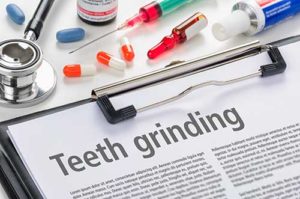Teen grinding also called bruxism, is when a person unconsciously applies pressure on the top teeth using the bottom tooth. When this grinding of teeth occurs, it damages all of the teeth touching and grinding into each other. A teeth grinding headache is another example of a complication from it. Teeth grinding in sleep is common and makes it hard to know you’re engaging in it. When you think this occurs, reach out to our team at Lovett Dental Conroe in Texas to get the help you need.
 Why Does Teeth Grinding Happen?
Why Does Teeth Grinding Happen?
It’s not always fully understood why a person grinds their teeth. Bruxism is sometimes a habit that develops when there are high instances of stress. This often leads to teeth grinding during the day without recognizing what is happening.
Other times, bruxism occurs when a person is sleeping. In this case, it may be a reaction to a sleep disorder like sleep apnea. That can lead to teeth grinding in sleep, headaches in the morning, and intense pain in the jaw. When this happens, don’t ignore it. Treatment is necessary.
What Happens when Grinding of Teeth Occurs?
The pressure applied during teeth grinding is the problem. It can cause several complications, including:
- Wearing down of the upper portion of the teeth
- Jaw pain
- TMJ pain
- Misalignment of teeth, especially over time
- Damage to the tooth roots and overall stability
Treatment for teeth grinding can resolve many of these complications. If you are unsure if you are experiencing teeth grinding in sleep or wakeful hours, come in for an appointment. Your specialty dentist can tell just from the damage to the tops of the teeth.
What Type of Treatment Is Available for Bruxism?
It’s always beneficial to fix the underlying cause when possible. That may be reducing the stress you feel or managing other health factors. For those with sleep apnea, your dental team may be able to help with a device that can reduce the blockage of the airway, reducing those symptoms. Another treatment option is to use a device that positions between the teeth and prevents the grinding from damaging the teeth themselves.
Sometimes, the condition improves on its own. It’s not wise to wait for help, though. Doing so allows the teeth to worsen, creating pain and misalignment issues. That can become intensely problematic over time.
What Should You Do Now if You Have Grinding of Teeth?
Your first step is to come in to speak to your dentist to learn more about your oral health needs. This may include:
- Guards to protect the teeth from grinding damage
- Restoration work to repair damage
- Help for TMJ if present
- Treatment for tooth infections or pain
- Support for alignment if the damage is severe
Sometimes a dental cleaning and exam can relieve the underlying cause of bruxism. This may include things like a tooth infection or decay. That pain may lead to teeth grinding. A routine dental appointment may pick up on this, but a deep cleaning may offer a bit more support.
The most important step is to reach out. If you have a teeth grinding headache or a sore jaw in the morning, that’s an indication that you may benefit from treatment. These symptoms can improve significantly with proper care for the cause of the teeth grinding.
Ready to Get Help? Call Lovett Dental Conroe
Teen grinding is a condition not to ignore. If you are struggling with bruxism or grinding of teeth during the day, treatment options are numerous and can protect your dental health for years to come. For teeth grinding in sleep help, reach out to our dental team in Texas for an appointment. Call Lovett Dental Conroe at 936-760-2400 for support.
